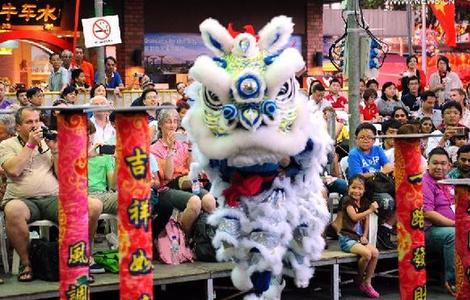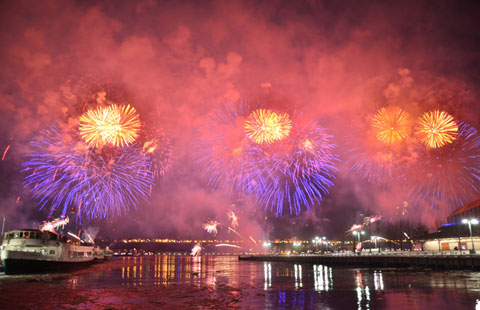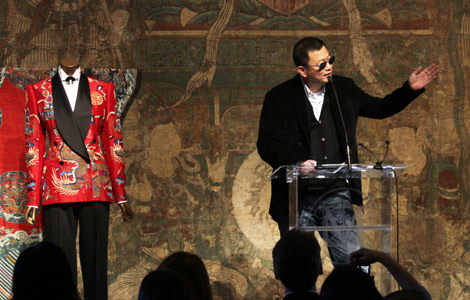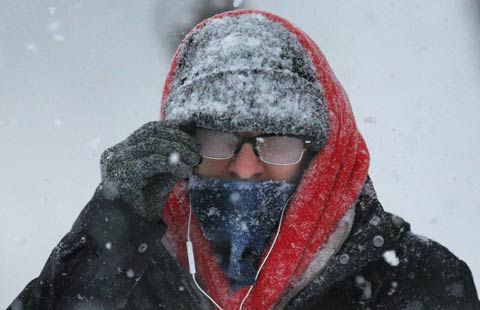Spending Spring Festival abroad
Updated: 2015-02-18 09:09
By ZHENG XIN/XIAO LIXIN(China Daily)
|
||||||||
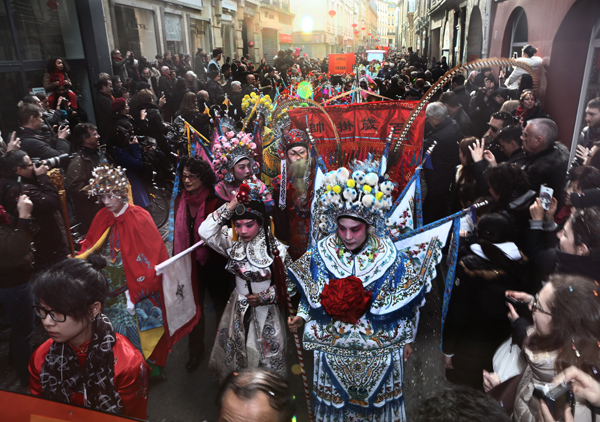 |
|
Revelers in traditional Chinese opera costumes take part in a Spring Festival parade in Paris in February last year. HUWEI / FOR CHINA DAILY |
The approach of Spring Festival could be easily detected in overseas Chinatowns shortly after the clock rang in 2015. Although the new year of the traditional Chinese calendar starts on Feb 19, Asian restaurants, groceries and supermarkets in large foreign cities around the world were stocking up on seasonal goods of all kinds, from red lanterns to Spring Festival scrolls, for local Chinese residents to do their Chinese New Year shopping.
Still, there are nostalgic voices among Chinese who complain that the lively Spring Festival mood that prevailed before the 21st century seems to be fading, even though standards of living were not as high back then.
Traditions such as spending Chinese New Year's Eve with the family and sitting at dinner tables graced by a traditional spread have made way for new practices, they say, as many Chinese families have opted to spend Chinese New Year overseas in recent years.
This will be the third year that Wei Wei, a 34-year-old college teacher in Hangzhou, Zhejiang province, will travel with his architect wife, Yu Shuli, and spend Spring Festival in a foreign country, after they had a pleasant time doing so in 2013.
"It is too cold in Hangzhou in the winter. That was the biggest reason why my wife and I wanted to spend the new year elsewhere, preferably somewhere tropical," Wei said. "We were surprised that when we mentioned our plan to our parents, they agreed without hesitation. They also feel that the Chinese New Year has become a mere formality."
With approval and support from the older generation, the couple decided to arrange a trip to Bangkok and Chiangmai in Thailand during Chinese New Year in 2013.
"Thailand is the perfect choice for us, because it not only meets our aim of spending the holiday somewhere warm with tasty exotic dishes, especially fresh seafood, but also because it is less costly in Southeast Asia," Wei said.
The couple "got addicted" to the idea and decided to continue the new practice.
"We went to Singapore and Malaysia last year and will go to Thailand again this year, but this time we will visit Phuket island," he said. "We will fly on Feb 19, after having the Chinese New Year's Eve dinner with my parents and parents-in-law."
Wei's story is typical of a fast-growing number of Chinese families who choose the alternative way of spending the traditional holiday.
More Chinese are willing to travel overseas than stay at home during the upcoming Spring Festival, according to a recently released survey by Ctrip.com, China's leading online travel agency.
About 40 percent of the respondents said they had plans to go abroad during this Spring Festival. For the first time, the figure exceeded that for domestic travel (37 percent) during the holiday.
The finding was echoed by the number of travel bookings on Qunar.com, a popular travel search engine. According to Liu Haibo, Qunar's flight ticket specialist, the number of travelers who made overseas travel bookings during the 2015 Chinese New Year witnessed a huge surge, with a year-on-year increase of 350 percent.
But with Spring Festival approaching, those with last-minute travel plans might realize that ticket prices have skyrocketed. Some tickets have even doubled in price during the holiday period.
As direct tickets can be expensive, many tourists have decided to book comparatively cheaper indirect tickets. Researchers at Ctrip found that those who selected the same trip with indirect flights sometimes paid up to half the price of direct flights.
To ensure the smooth transition between flights, the proposed connection time should be at least be 2 hours. Ctrip's experts also advise people to pick the same airline for connecting flights where possible.
Thailand, Bali and Maldives are the top three destinations Chinese would like to visit during Spring Festival, followed by other relatively short-distance outbound attractions such as Hong Kong, Japan and South Korea.
"Thanks to the depreciation of the Japanese yen and its favorable visa policy, trips to Japan are particularly popular," said Rao Tian, deputy manager of outbound tourism sector, China International Travel Service.
"Plus, since now is the best season to visit Southeast Asia, Hong Kong and Taiwan, there are only a few seats left in package tours to these destinations."
According to Tuniu.com, a domestic online tourism booking platform, the number of Chinese travelers who have booked trips via its website to Southeast Asian countries during the Chinese New Year has tripled this year, with Phuket in Thailand, Bali in Indonesia and Boracay in the Philippines among the most popular spots.
Cruise travel has also been high on the list of Chinese travelers' choices during Spring Festival. According to ly.com, another major online travel agency, cruise travel packages have taken up about 30 percent of online reservations, increasing more than 40 percent from the same period last year. Travel routes are mostly to neighboring countries such as Japan and South Korea and last about five days.
The trend of going on overseas trips is partly due to the increasing number of countries modifying their visa application procedures to attract more visitors from China, said Chen Gang, CEO of Mafengwo, China's largest tourist information-sharing website.
Destinations with easier visa application processes are increasingly popular. Chinese tourists have a much wider range of choices than before and travelers would rather go abroad within the same budget, according to Ctrip.
Many countries are now scrambling to ease their visa application procedures to attract more Chinese visitors and grab a larger slice of the pie. About 50 countries and regions have visa-free or "visa-on-arrival policies" for Chinese citizens.
To better cater to the needs of Chinese tourists, tourism authorities and shops have also offered many incentives to them during Spring Festival.
For example, Chinese travelers cannot only pay by Union Pay in shopping malls in popular tourist destinations, such as popular department store Galeries Lafayette in Paris, but are also warmly greeted with the slogan "Welcome to Myongdong" in Chinese at the entrance of one of the most popular shopping areas in South Korea's capital Seoul, with shop assistants speaking fluent Chinese.
Most Viewed
Editor's Picks

|

|

|

|

|

|
Today's Top News
Upbeat on US-China relations
Beijing-San Jose nonstop planned
Wealth of China's super rich to rise in Year of Goat
Empire State Building turns colors of national flags
Chinese man compensated for 8 years wrongful custody
Metropolitan Museum of Art to focus on China
Reward raised for clues to Chinese family's slaying
New visa policy draws more Chinese tourists
US Weekly

|

|
